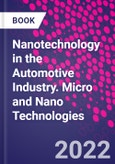Nanotechnology in the Automotive Industry explores how nanotechnology and nanomaterials are used to enhance the performance of materials and devices for automotive application by fabricating nano-alloys, nanocomposites, nano coatings, nanodevices, nanocatalysts and nanosensors. Consisting of 36 chapters in 6 parts, this new volume in the Micro and Nano Technologies series is for materials scientists, nanotechnologists and automotive engineers working with nanotechnology and nanomaterials for automotive applications.
Nanotechnology is seen as one of the core technologies for the future automotive industry to sustain competitiveness. The benefits that nanotechnology brings to the automotive sector include stronger and lighter materials for increased safety and reduced fuel consumption, improved engine performance and fuel consumption for gasoline powered vehicles due to nanocatalysts, fuel additives and lubricants, and more.
Please Note: This is an On Demand product, delivery may take up to 11 working days after payment has been received.
Table of Contents
PART 1: BASIC PRINCIPLES 1. Nanotechnology in the automotive industry: An introduction2. Methods for testing materials for automotive application3. Methods for testing devices for automotive application4. Mathematical modeling for the degradation of materials when used in supercars5. Toxicity/risk assessment of nanomaterials when used in the automotive industry6. Nanoscale interface techniques for standardized integration of nanodevices
PART 2: NANO-ALLOYS FOR AUTOMOTIVE APPLICATION7. Nano-alloys: An introduction8. Titanium nano-alloys9. Aluminum nano-alloys10. Copper nano-alloys11. Braze nano-alloys
PART 3: NANOCOMPOSITES FOR AUTOMOTIVE APPLICATION 12. Nanocomposites: An introduction13. Carbon-carbon nanocomposites14. Fiber-reinforced nanocomposites15. Polymeric nanocomposites16. Metallic nanocomposites17. Ceramic nanocomposites18. Rubber nanocomposites (nano-reinforced tires)
PART 4: NANO COATINGS FOR AUTOMOTIVE APPLICATION 18. Nano coatings: An introduction19. Thermal protection nano coatings20. Self-healing nano coatings21. Self-cleaning nano coatings
PART 5: NANOELECTRONICS FOR AUTOMOTIVE APPLICATION21. Nanoelectronics: An introduction22. Smart nanosensors network (Smart nanosensors for remote sensing satellites)23. Smart nanobatteries 24. Nanomaterial-based solar cells25. Nano-robots (bio-nano robots)26. Smart electronic textiles
PART 6: NANOCATALYSTS FOR AUTOMOTIVE APPLICATION27. Nanocatalysts: An introduction28. Nanocatalysts for exhaust emissions reduction29. Nanocatalysts for fuel cells (nano fuel cells)30. Nano-lubricant additives (for enhancing the thermophysical and tribological properties of engine oils)








